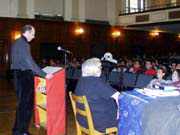Though the Holocaust was one of the most horrendous occurrences in history, the fact that it happened over 60 years ago means that as time marches on, it has a way of fading from memory. But last week, the horrors were brought into the present for Memorial High School students when a Holocaust survivor, Judith Perlaki, visited and spoke.
Perlaki’s son Larry also spoke, relaying to the assembled crowd what it is like being the offspring of a survivor. Memorial High School Peer Leadership Coordinator Ed Donnelly coordinated the assembly. Donnelly has been best friends with Larry Perlaki for decades. In fact, both men acted as best man at each other’s wedding.
But it was only recently that Donnelly felt comfortable enough to ask Larry and his mother to come speak.
“Actually, I was aware of their [Larry and Judith’s] talking to groups of people for a while,” said Donnelly in a recent interview. “But last year, a couple of students and I spoke to Judith, and I was blown away by her love and tolerance.”
Donnelly felt that it was very important to bring a real-life survivor to the school to illustrate what it was like. Said Donnelly, “It’s probably a once in a lifetime opportunity to meet someone like this.”
At last week’s assembly, Donnelly spoke to the crowd.
“Many of you have seen the movies and read the books, but now you’re going to see a face that was behind the barbed wire.”
As the somewhat rambunctious audience glimpsed Judith Perlaki taking a seat in front of them, they quieted immediately.
Prejudice still happens
After the applause died down, Donnelly continued his introduction, in which he paraphrased a line of dialogue from the movie Contact. Said Donnelly, “Human beings are capable of such amazing beauty and yet capable of such nightmares.”
Donnelly added that history has a way of repeating itself and “we are still seeing these things happening. James Byrd, the black man who was dragged to death [in Texas], Matthew Sheppard, who was killed for being gay – what is it about human the character that causes us to act this way?”
At this point, Larry Perlaki took to the microphone and shocked the crowd with simple numbers. He mentioned the horrible events of Sept. 11, 2001 and how 3,000 people perished in one day. He then stated that 3,000 people would have to die every day for six years to equal the number of Jews that perished in the Holocaust. Gasps were overheard from the audience.
Larry Perlaki painted a picture of the audience of just how horrific the Holocaust was for his mother. Said Perlaki, “April 17, 1944, the knock came at the door – this knock would forever change the lives of an entire family. They were transported to a ghetto and a month later, on May 5, 1944, the deportation of Jews began to Auschwitz and other death camps.”
Added Perlaki, “The gas chambers were on a ’round-the-clock schedule.”
Interestingly, according to Perlaki, Judith chose to not talk about the Holocaust as he was growing up. Said Perlaki in a recent interview, “The children of Holocaust survivors have grown up with their parents dealing with what happened in various ways. Some spoke of it all the time – ‘Finish that food! In Auschwitz, we would have been happy to get that scrap.’ Other families did not want to burden their children with it.”
Larry Perlaki, who attended a Yeshiva in New York City from 1958 to 1967, was never taught about the Holocaust in school. It was only when he made it to public school and started taking classes on the Holocaust did the full scope of what happened hit him. And he began asking questions of his mother.
At this point, Judith began telling the stories of the camps. This was life-changing for Larry. “It caused a life-altering outlook in me,” said Larry Perlaki. “I appreciate things much more now.”
Perlaki ran a slide presentation that showed pictures from a trip back to Auschwitz that Larry, Judith and her two sisters, Elizabeth and Lily, took in 1991. The images, taken during a bright, sunny day, show plain, nondescript brick buildings that nonetheless hosted the most horrific events the world has ever seen.
For her part, Judith has an almost matter-of-fact air about what happened. It occurred and she has moved on. But her message for the assembled students was quite serious, yet heartfelt.
Said Judith Perlaki, “I don’t hate the Germans. Hatred and intolerance were the direct reasons for the Holocaust. Fill your hearts with love. We’re all created equal. We smile the same when we are happy. We cry the same tears when we are sad. There are two kinds of people in this world – good and evil.”
Added Judith, “Isn’t it wonderful to wake up in the morning? Isn’t it great to live in the greatest country in the world? Be thankful for what you have.”
As the assembly continued, students were allowed to ask questions of Judith. One student asked, “Why don’t you remove the tattooed number on your arm [A6933]?”, Judith answered, “Because when I die, it will be proof. I have to go straight to heaven, because I’ve already been to hell.”
All the stories of familial separation and cruelty became too much for one student, Yarina Abreu, who wept openly, saying through her tears, “I’ll never forget you. This means so much to me. I thank you so much for being here and I am always going to remember you.”
Reached later for comment, Abreu explained her reaction.
“Like I said then, to me, family is the greatest thing,” she said. “And when she was telling those stories and she said that she doesn’t hate the Germans for it, it really hit me. It’s a great message. It’s all about tolerance.”
